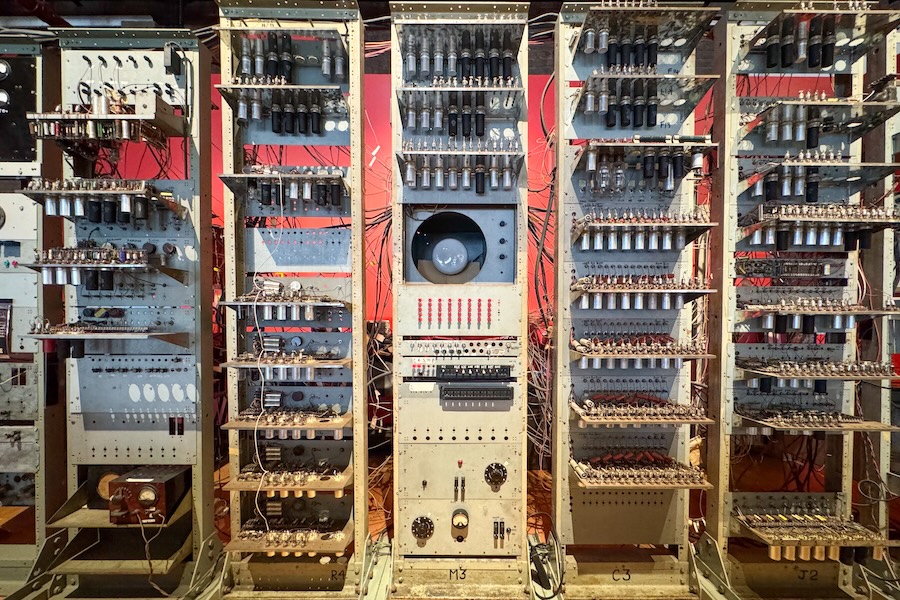Manchester has gifted the world many change-making inventions.
One of the biggest? The computer.
Nobody really knew what it did at first.
It could subtract numbers. It could play a strange, electronic version of a Christmas carol. It cost the equivalent of around £3 million in today’s money.
But in 1948, inside a quiet lab at the University of Manchester, something happened that would change the world forever. A box of wires, valves and blinking lights ran a set of instructions stored in its own electronic memory.
They called it ‘Baby’.
It was the first computer of its kind – the first stored-program computer. That one idea is still how all modern computers work today.
The world’s first stored-program computer: The Manchester Baby
Baby wasn’t built to look impressive. It wasn’t meant to be a headline. It was an experiment.
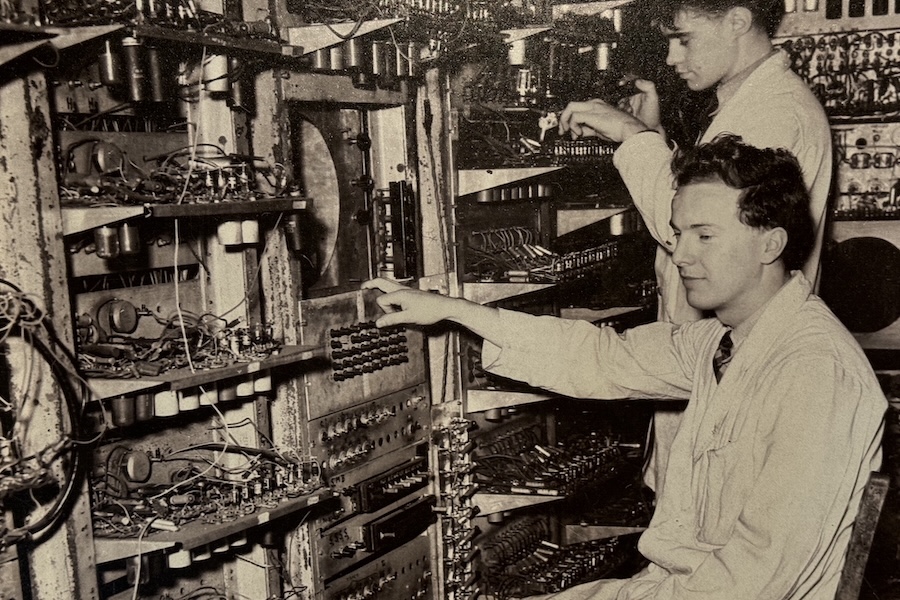
Tom Kilburn and Freddie Williams, two brilliant engineers at the University of Manchester, were trying to solve a simple problem: how to store information inside a machine using electricity.
The solution was Baby. It ran its first program on 21 June 1948, proving for the first time that a computer could store and run instructions electronically. This meant the same machine could do different jobs, just by loading a different program.
That might sound obvious today. But in 1948, it was revolutionary.
And just like we talk about AI now, people back then asked the same big questions.
Can it think for itself? Could it become more intelligent than humans? Should we be worried?
It felt like science fiction – because it was. But the world was waking up to the idea that machines could do more than just calculate.
As Freddie Williams later put it:
“Nothing was ever the same again.”
Alan Turing’s role in Manchester’s computing revolution
Alan Turing didn’t build Baby – but his thinking helped shape it.
Already famous for his wartime work breaking the Enigma code, Turing joined the University of Manchester in 1948, just months after Baby’s first run. He brought with him a powerful idea from a paper he wrote in 1936: the concept of a “universal machine” – one machine that could do anything, given the right program.
Working alongside Kilburn and Williams, Turing helped design the next stage: the Manchester Mark I, a more powerful machine based on Baby’s principles. He also wrote some of the world’s first software programs – including an early chess engine.
His legacy has inspired generations of technologists, including Apple co-founder Steve Jobs, who was fascinated by Turing’s story and saw him as one of the true pioneers of the digital age. Jobs reportedly spoke of Turing’s genius and the tragedy of his life with real admiration.
His vision helped set the stage for the entire software industry, and some even believe he invented AI.
“Sometimes it is the people no one imagines anything of who do the things that no one can imagine.”
Manchester creates the world’s first commercial computer
After proving the idea with Baby and Mark I, the University of Manchester teamed up with local engineering company Ferranti.
The result? The Ferranti Mark 1, the world’s first commercially available computer. It was sold to universities, businesses and the government, starting in 1951.
Manchester had gone from experiment to enterprise in just three years.
Ferranti went on to launch Europe’s first microchip in 1976, cementing Manchester’s role as a global leader in computing innovation. Microchips made computers smaller, faster and more affordable – paving the way for the personal computer boom.
From Kenbak-1 to Playstation: how computers became personal
Baby grew up.
In the early 1970s, the Kenbak-1 appeared. Often called the world’s first personal computer, it had no keyboard or screen – just switches and lights. But it proved people could own and program their own machines.
By the 1980s, microchips powered the home computer revolution. Machines like the BBC Micro, ZX Spectrum and Commodore 64 arrived in bedrooms, classrooms and living rooms across the UK.
Then came gaming.
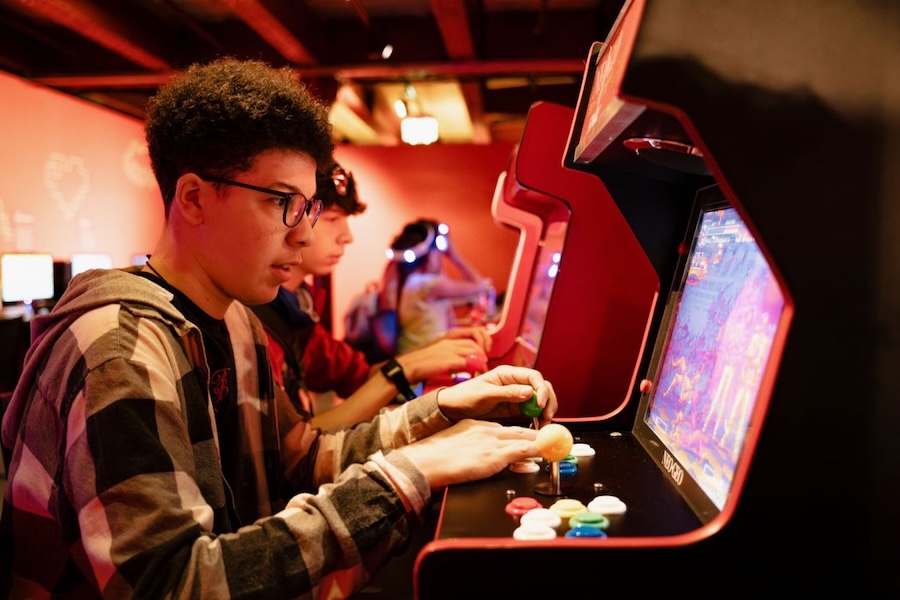
Consoles like the Atari 2600, Nintendo Entertainment System and Sega Mega Drive brought computing into the world of play. And by the 1990s and 2000s, computers were in our pockets, in our cars and in our homes.
And it all started with a blinking box in Manchester.
Visit the world’s first computer at the Science and Industry Museum Manchester
Today, you can visit a full working replica of Baby at the award-winning Science and Industry Museum in Manchester. It sits alongside the original equipment, still humming with history.
Volunteer Eric Wright was just four when Manchester’s ‘Baby’ became the world’s first modern computer. Decades later, it would shape his future.
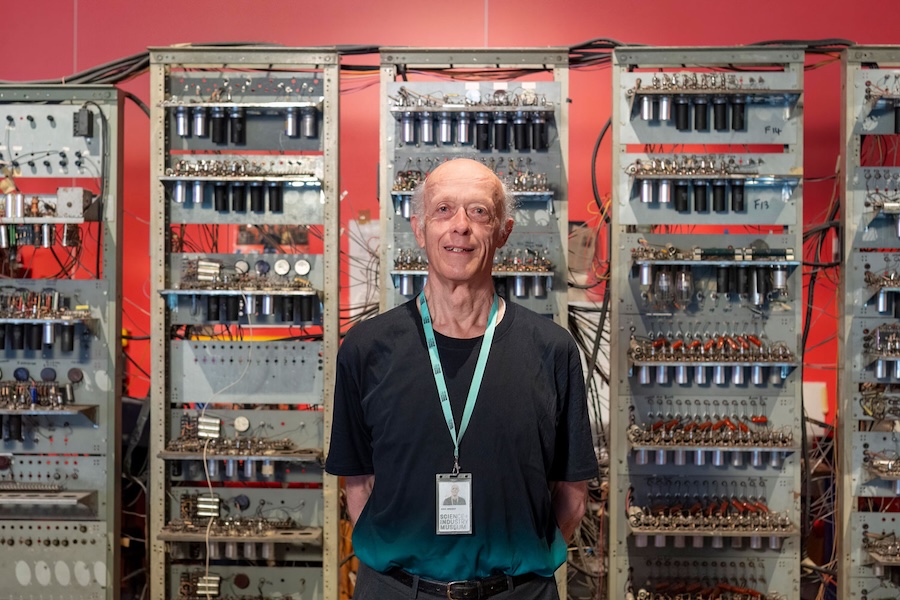 Volunteer Eric Wright in front of ‘Baby’ the Manchester Small-Scale Experimental Machine
Volunteer Eric Wright in front of ‘Baby’ the Manchester Small-Scale Experimental Machine
“I didn’t realise how computers would advance in my lifetime,” he says.
As a teenager, he built his own radios. That passion led him to study at the University of Manchester, where he was taught by Baby’s creators, Professors Williams and Kilburn.
“With hindsight, it was a great honour,” Eric says. “I’d been taught computers from the bottom up, and that made all the difference.”
Years later, seeing Baby at the museum felt like coming home. “It was like going back to 1959,” he says, “using the same components I started with.”
From 128 bytes to gigabytes, he adds, “Today’s RAM still works on the same principle invented in Manchester. That’s truly remarkable.”
It’s not just a display, it’s a reminder. That from a single experiment, one of the world’s biggest technological revolutions began.
Power Up: play 150+ games consoles at Manchester’s ultimate gaming experience
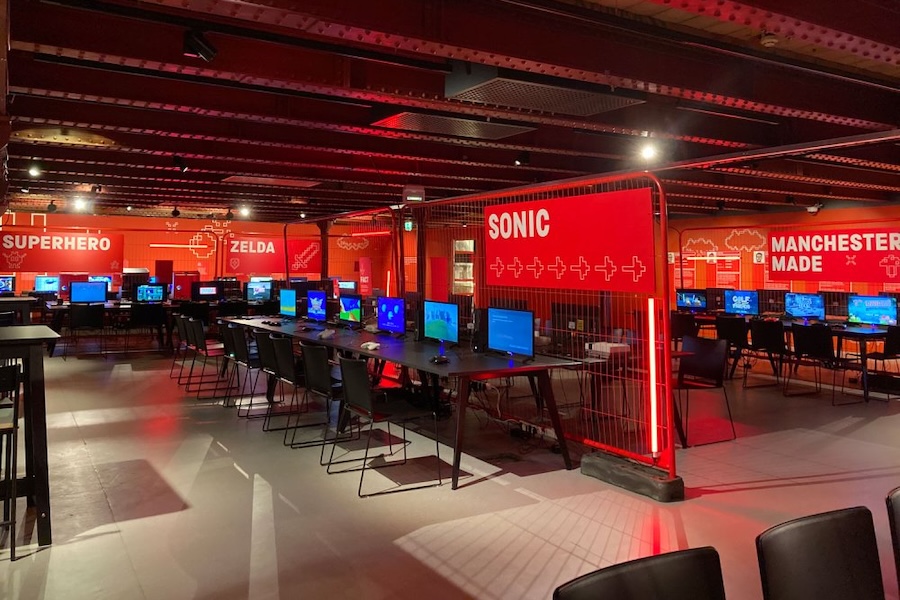
Just a short walk from Baby, the Science and Industry Museum is also hosting Power Up – a huge, hands-on celebration of five decades of gaming.
With over 150 consoles to play – from Pong to Pac-Man, Minecraft to Mario – Power Up is the perfect way to experience how computers became play machines.
Try out retro favourites, discover hidden gems, or dive into the latest virtual reality experiences. It’s fully interactive and recommended for ages 7 and up (Key Stage 2+). Ideal for families, school groups or anyone who’s ever picked up a controller.
Power Up isn’t just about nostalgia. It encourages problem-solving, critical thinking, collaboration and creativity – all through the power of play.
From early arcade machines to cutting-edge tech, it’s a journey through how gaming shaped generations – and how Manchester played a part in making it all possible.
Manchester’s place in computing history
The world’s first stored-program computer was born in Manchester.
Baby was the first of its kind. It inspired Alan Turing. It led to the first commercial computer. It helped launch the microchip revolution.
It laid the foundations for the world we live in now – one where computers power everything from games to global systems.
Today, we carry the legacy of Baby in our pockets. Every time we use a phone, play a game, send a message or load an app, we’re using the same idea that Baby proved in 1948.
From a blinking light in a Manchester lab to a global digital world. It all started here – in Manchester.
